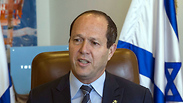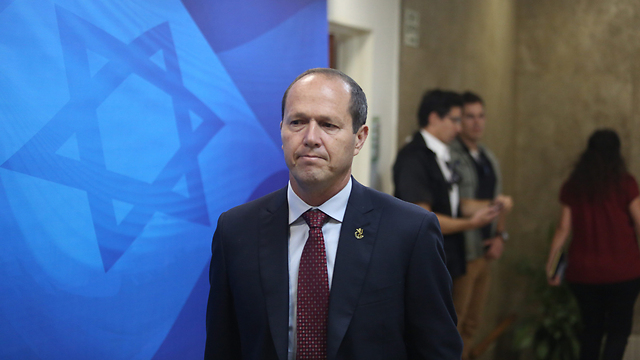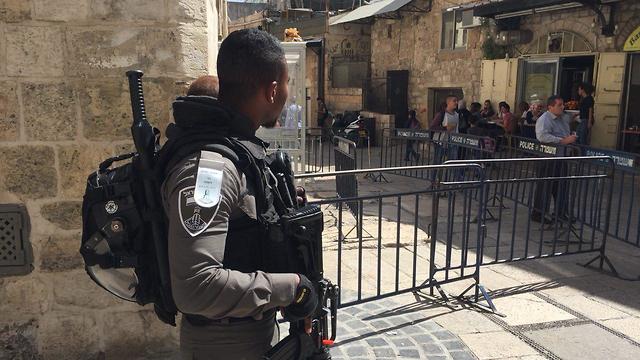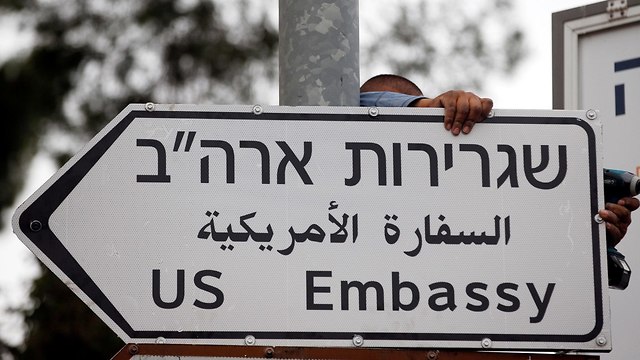
Jerusalem Mayor Barkat
Photo: AP

Barkat: east Jerusalem residents 'pleased with US Embassy move'
Embassy move signaling 'things are changing in the Mid-East and world in general,' Jerusalem Mayor Barkat claims, adds he believes Jerusalem will not be partitioned; sending calming message, Barkat adds 'what's happening on Gaza border does not affect us.'
Jerusalem Mayor Nir Barkat commemorated 51 years to the capital's unification this week with a series of events—a special Cabinet meeting he attended and the US Embassy's opening in Jerusalem—and
asserted that when Jerusalem succeeds, the State of Israel succeeds.

Speaking about the embassy move in a Ynet studio interview, Barkat noted it marked "historical recognition of the link between Jerusalem and the Jewish people. US President Donald Trump's warm words were nothing less than dramatic.
"The president has joined hands with Prime Minister Benjamin Netanyahu in strengthening the ties of the peace-loving world and put up an iron wall opposite the Iranian axis of evil."

Jerusalem Mayor Barkat said the embassy move meant 'historical recognition of the link between Jerusalem and the Jewish people' (Photo: Amit Shabi)
On the same matter, Barkat opined that "the two things combined, along with the recognition of Jerusalem, constituted a new world order. The mere move symbolizes a change in Israel and the Middle East in general. That's the real celebration—positioning Jerusalem, signaling that things are changing in the Mid-East and the world in general."
Alongside the festivities, there was some concern ahead of the embassy move and possible attempts to disturb the peace as part of the Palestinian Nakba Day protests.
Barkat was unmoved, and sought to communicate a calming message, saying, "We trust in our security forces all year round. Jerusalem is very quiet today, and what's happening on the Gaza border did not affect the city."
"Residents of the eastern portion of the city understand that this is a seismic shift, and—truth be told—I'm convinced in their heart of hearts they are even pleased because it will improve their quality of life," the Jerusalem mayor claimed.
"We see them choosing Israeli matriculation exams in greater numbers, asking for Israeli citizenships—they're going through a process of 'Israelization,' and (the embassy move) will serve their interests as much as it does anyone else's," he concluded.
Asked whether Jerusalem was divided, Barkat invited interviewers to visit the Old City. "Every square kilometer has more mosques, synagogues and churches than anyplace else in the world," he said.
"Look at the people there. Visit our hospitals, our workplaces in the public sector. There are Haredi, secular and Arab neighborhoods, but the city is one unit. It was unified in 1967 (in the Six Day War—ed), and we're connecting it using transportation infrastructures, a single economy and one constantly-improving service sector," he stated.
On fears that Trump may force a change in Jerusalem's status, the mayor said he heard rumblings of a similar nature before. "Jerusalem will not be partitioned," Barkat vowed, "and President Trump said one thing very clearly—that understandings needed to be reached."
"As far as Israel is concerned, I don't see any possibility of Jerusalem being partitioned. We're better off with no deal at all than a bad deal. I'm highly optimistic regarding Jerusalem's prospects—and Israel's as a whole," he concluded.

















